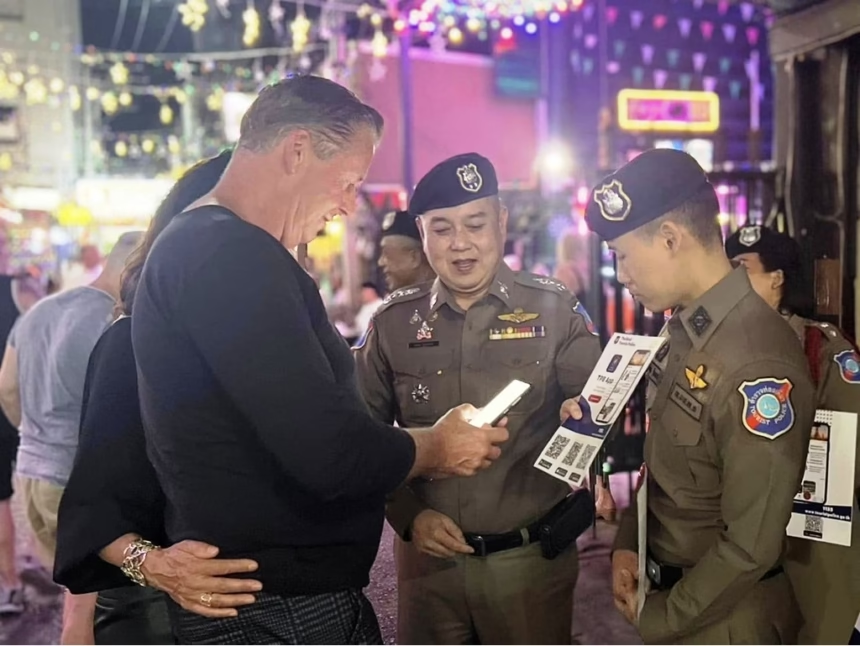BANGKOK – Thailand’s Tourist Police Division has issued a strong nationwide warning about a new wave of scams that has already drained more than ฿1.2 billion from foreign visitors in the first ten months of 2025. The Tourist Police report the old “zero-dollar tourism” scams, once thought broken up in 2016, have returned in smarter and more personal forms.
“We are no longer dealing with cheap mass tour packages run by hidden Chinese operators,” a police spokesperson told reporters. “These criminals now target individual travellers through social media, fake online reviews, and even dating apps. They speak several languages, understand technology, and have no sympathy.”
The most common new trick starts in a friendly way. A local person, often an attractive woman or a stylish man in their 30s, approaches tourists outside major sights such as the Grand Palace, Wat Pho, or Doi Suthep in Chiang Mai.
Within a few minutes, the stranger claims the attraction is “closed for a Buddhist ceremony” or “closed for royal renovation”, then offers to guide them instead to “special” temples or so-called government gem shops where, for “today only”, foreigners can buy jewellery at tax-free wholesale prices.
Tourists who accept a free ride in a tuk-tuk or private van are taken on a carefully planned route that ends in high-pressure jewellery shops. These are often in Bangkok’s Bang Rak district, small streets in Phuket Town.
Inside, pushy sales teams backed up by people in uniforms pretending to be “government certifiers” use fake GIA papers, sleight-of-hand with stones, and threats to call the police to force payments from US$5,000 up to US$150,000.
“Many tourists think paying by credit card keeps them safe because they can challenge the charge later,” said Australian visitor Mark Reynolds, 58, who lost US$37,000 in Phuket last month. “But the shops swipe the card several times for different ‘items’ and give you signed invoices that make a refund almost impossible.”
The “Closed Today” Trick Spreads Across Northern Thailand
In Chiang Rai and the wider Golden Triangle region, Tourist Police have seen a sharp rise in cases since the Fourth Friendship Bridge reopened and overland arrivals from China surged following the permanent visa-exemption policy in March 2025.
The Chiang Rai Tourist Police told the Chiang Rai Times that her team handled 47 complaints in October alone, three times the number from the same month last year. “They now use Burmese, Lao, and people dressed in Akha clothes near the Hall of Opium and Wat Rong Khun to approach seem more local and less like the old Bangkok scam,” she said.
In one bold variation, fraudsters pose as immigration officers at the Mae Sai border checkpoint. They tell visitors they must pay new “environmental protection fees” or buy “northern Thailand entry permits” in cash on the spot. Those who refuse face threats of instant deportation.
Social Media and Dating Apps Become Prime Hunting Grounds
The most worrying shift is the move to online platforms. Tourist Police showed screenshots of fake Instagram and TikTok accounts with tens of thousands of followers advertising “private VIP tours” of hidden canals in Bangkok, “secret” full-moon parties on Koh Phangan, or “authentic hill-tribe homestays” in Mae Hong Son that do not exist.
On dating apps such as Tinder and Bumble, long-running “romance-gem” scams have been repackaged. After several weeks of chatting and video calls, the supposed boyfriend or girlfriend suggests a visit to a family jewellery factory, “just to have a look”.
From there, the story follows the usual gem shop script, but with a twist. The victim now feels emotionally attached and is far less likely to leave or question the situation.
“We have seen Australian, German, British, and now more Indian and Middle Eastern men lose six-figure sums because they think they are helping a partner start a better life,” said Pol. Lt. Col. Supattra Boonmak, head of the Tourist Police cyber unit.
Police Crackdown and New Protective Measures
In response, the Royal Thai Police has launched “Operation White Elephant”, a joint task force that brings together the Tourist Police, the Department of Special Investigation (DSI), and the Anti-Money Laundering Office (AMLO). Raids last week on 14 jewellery shops in Bangkok and Phuket led to 38 arrests, including three Taiwanese nationals and one Singaporean, believed to be regional organisers.
Authorities have also introduced a series of prevention tools:
- Giant LED warning screens in English, Chinese, Korean, Arabic, and Russian at Suvarnabhumi, Don Mueang, and Phuket airports with the message: “NO SUCH THING AS GOVERNMENT GEM SHOP”.
- QR codes on all immigration arrival cards that link to an official Tourist Police scam-reporting app.
- Mandatory registration and GPS tracking for all vans and tuk-tuks that work within 5 km of major temples.
- A 24-hour English-language hotline (1155) is now staffed by 120 officers on rotating shifts.
Police still admit that progress is slow. Many shops reopen under new names within days, while the real leaders stay abroad or hide behind powerful local networks.
Front-Line Advice for Travellers
The Tourist Police in Chiang Rai shared clear guidance for visitors:
“If anyone, no matter how friendly or official they look, tells you a major temple is closed, they are lying. Temples in Thailand stay open to the public, apart from genuine royal funerals. Walk away, then take a metered taxi or book a Grab straight to where you want to go.”
She also cautioned tourists not to accept rides from touts with fake TAT (Tourism Authority of Thailand) badges. These are now mass-produced in neighbouring countries and sold online for as little as ฿150.
A Risk to Thailand’s Image?
Tourism makes up around 18 to 20 percent of Thailand’s GDP, and the country welcomed a record 38 million visitors in the first eleven months of 2025. Industry groups worry that viral clips of distressed tourists at police stations will push away the higher-spending independent travellers that Thailand is keen to attract as numbers from Chinese tour groups level off.
“Every scam victim tells at least ten friends, and those friends usually post something on social media,” said Charoen Wangananont, president of the Thai Hotels Association Northern Chapter. “We cannot afford another reputation crash like we saw in 2016.”
For now, police and honest tourism operators share the same message: enjoy the Land of Smiles, but stay alert and trust your instincts. As one Chiang Rai tuk-tuk driver who refuses to join the scams said, “If it sounds too good to be true, or too perfectly arranged by a stranger who came up to you, it is almost certainly not true.”
Tourist Police urge anyone who believes they have been targeted, even if they did not lose money, to make a report as soon as possible. “The more information we receive,” Gen. Phanthana said, “the quicker we can track these groups and shut them down.”
Anyone with information can call the Tourist Police hotline 1155 (English, Chinese, Korean, Japanese, Russian, French, and German available) or use the Tourist Police i lert u app on iOS and Android.














